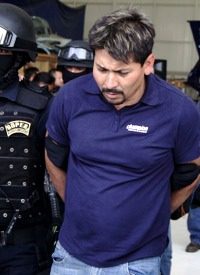
Violence has exploded in the Mexican state of Michoacan following the arrest of an alleged leader of a powerful drug cartel known as “La Familia” — “The Family” in English. Earlier this week the cartel left the bodies of 12 tortured federal agents piled along a highway as a warning to government officials. In a string of related attacks, they also killed six federal agents and two soldiers.
The coordinated retaliation over the arrest spread through three states and included heavily armed gunmen throwing grenades and firing on federal police stations and hotels where agents were staying. The government has responded by sending more than 5,000 federal police, soldiers, and navy personnel to the state. The Mexican president already deployed nearly 50,000 troops and tens of thousands of federal police officers in a catastrophic effort supposedly meant to quash the nation’s drug trade.
"Without a doubt La Familia is known for its violence,” said Mexican national security spokesman Monte Alejandro Rubido. “We shouldn’t be surprised by their reaction." Over the weekend police arrested Arnoldo Rueda Medina, an alleged “chief of operations” for the cartel based in President Felipe Calderon’s home state of Michoacan. Federal forces have also arrested seven mayors and even the state prosecutor there on charges of collaborating with the cartels.
While the violence raged on, U.S. secretary of state Hillary Clinton reiterated Thursday that the U.S. is still committed to helping Mexico’s government wage its war — the Merida initiative will provide $1.4 billion to arm and train Calderon’s drug warriors.
"We have worked very closely with his administration to provide additional support for police training and it is our assessment that the steps taken and the commitment demonstrated by the Calderon administration is deserving of confidence," she said at a joint-press conference with Mexico’s foreign minister. "What we see here is an administration under President Calderon locked in a very difficult battle with the most ruthless drug traffickers and criminal cartels anywhere on the planet."
But according to an Associated Press report entitled “Mexico sends more police, army after gang attacks,” the Mexican government’s expanding battle has “raised the concerns of human rights organizations, which have alleged cases of abuse by authorities.” As reported previously in The New American, corruption among law enforcement, military, and government officials in Mexico runs rampant. The federal government just arrested a former army captain for selling sophisticated military weaponry to the cartels. So overall, the war doesn’t appear to be going well. Over 11,000 people have been killed in drug-related violence since Calderon took office.
On Wednesday a man claiming to be Servando "La Tuta" Gomez — a La Familia leader — called a TV station and indicated a willingness to negotiate with the government, the Associated Press reported. He said the attacks were only in retaliation for police action against family and friends. “They are targeting innocent people in Michoacan state," the man said. The government was trying to confirm his ID on Wednesday.
But the interior minister has said that even if it is the notorious leader, the "federal government does not ever dialogue, does not negotiate, does not reach deals with any criminal organization." Instead, the government is offering a reward of up to $2 million for information leading to his arrest, claiming he ordered the attacks on federal forces this week.
With the violence continuing to rise despite ever more money and fire power, a new approach to the problems presented by drugs must be considered. Innocent Mexicans are often caught up in this war through no fault of their own, and with the body count reaching into the tens of thousands it’s time for a new plan. Just like alcohol prohibition resulted in ever more powerful mobsters and violence, the death toll from the current war will continue upward until something changes.
The U.S. federal government doesn’t even have constitutional authority to wage a war on drugs in the U.S., let alone fund and equip drug wars in foreign lands with corrupt regimes. The American government should immediately quit promoting and funding these unconstitutional abuses and allow states to implement sensible solutions on their own. Enough is enough.
AP Images Photo: Police escort Arnoldo Rueda


